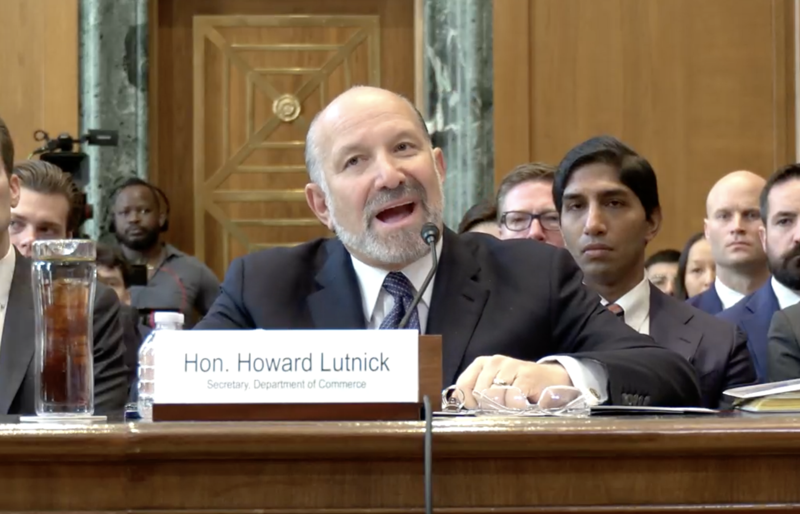U.S. Sen. Lindsey Graham, R-S.C., defended President Donald Trump’s trade policies Wednesday as legal challenges continue over the president’s use of tariffs.
Graham spoke during a Senate subcommittee meeting with U.S. Commerce Secretary Howard Lutnick. Even so, it was clear that his colleagues, even members of the GOP, weren’t all on the same page about tariffs. Several senators talked about how tariffs hurt businesses in their communities or how much their states export overseas.
“These tariffs have a purpose: To make us safer and stronger,” Graham said. “We’ve been talking about China, we’ve been talking about getting ripped off. I want to thank you and President Trump for doing something about it.”
Graham said Trump’s 25% tariff on foreign automobiles and auto parts is helping his state, South Carolina. The senator said that leaders of major car companies in Germany came to the U.S. to meet with Trump to talk about making more cars in America.
Lutnick said those car makers agreed to invest more than $100 billion in U.S. operations.
“The American dream is to own a German car,” Graham said with a laugh.
“As long as it made in South Carolina,” Lutnick responded.
Graham said Trump’s trade policies are working.
“What you’ve done is you’ve got people to come here and talk to us differently,” Graham said. “They’re talking about making the engine in South Carolina. They’re talking about making more content in South Carolina.”
He added: “So this is working folks.”
Sen. Jeanne Shaheen, D-N.H., told Lutnick she saw things differently. She talked about a New Hampshire-based company that makes ball bearings for the aerospace industry. She said the company, which does business with the U.S. Department of Defense, was concerned about steel tariffs, which were not only pushing up prices but also taking longer to obtain.
“Not only has their cost gone up, but the lead time to get the steel to make the bearings – they only have one domestic supplier … they said the lead time has gone from 20 weeks to two and a half years because of the tariffs,” she said. “I think this creates a real challenge with respect to our national security.”
Shaheen asked if Trump and Lutnick had considered the national security supply chain before implementing tariffs. She also said the Pentagon seemed unaware of Trump’s tariff policies’ impact on the defense industry.
Lutnick said the Pentagon was consulted before the higher steel and aluminum tariffs were announced last week. Those 50% tariffs on steel and aluminum went into effect on Wednesday.
Lutnick said the issue was related to cost of the products and not access to it. When Shaheen said it was indeed an access issue, Lutnick pushed back.
“That would be illogical,” he said.
Shaheen wasn’t having it: “Their lead time has gone from 20 weeks to two and half years. At that rate, it’s hard for me to understand how we can continue to support our defense industry when we don’t have the ability to get the supply chain that they need to operate.”
Lutnick said it would be impossible to fight a war without the ability to make steel and aluminum domestically.
“That is what the president is doing. He’s trying to make sure that we make sufficient steel and aluminum to protect our defense industry,” he said.
Shaheen said she didn’t agree with the way the tariffs were being handled, especially if re-shoring industry jobs will take years.
“Because we’re not going to have the steel that we need immediately to provide the supplies we need immediately,” she said.
Shaheen said better planning was needed before tariffs were put in place.
On April 2, dubbed “Liberation Day” by the president, Trump announced reciprocal tariffs on scores of other nations, but suspended those higher rates for 90 days while his trade team went to work. Since then, Trump’s team has announced a limited trade deal with the United Kingdom and a tariff truce with China while talks continue.
Those “Liberation Day” tariffs face legal challenges from states and small businesses. A three-judge panel on the U.S. Court of International Trade unanimously ruled last week that Congress did not give the president tariff authority under the International Emergency Economic Powers Act of 1977. The court gave Trump 10 days to unwind all the tariffs he issued under IEEPA. The administration appealed that decision and asked for an emergency stay. The appeals court granted that request, putting the Court of International Trade ruling on hold while the appeal continues.
In his second term, Trump has made tariffs the centerpiece of his foreign and domestic policy efforts. He has repeatedly announced tariffs, only to suspend them days or sometimes hours later. It started in February when Trump threatened to put 25% tariffs on Canada and Mexico. Trump later reversed course after reaching limited deals with those neighboring countries.
The most significant switch was on his “Liberation Day” tariffs on April 2, when he announced higher reciprocal tariffs on dozens of nations. Seven days later, he suspended those higher rates for 90 days to give his trade team more time to make deals. After a weekend of talks in Geneva, he also backed off 145% tariffs on China. So far, Trump has kept a 30% tariff on imports from China and a 10% baseline tariff for all imports.
Economists, businesses and some publicly traded companies have warned that tariffs could raise prices on a wide range of consumer products.
Trump has said he wants to use tariffs to restore manufacturing jobs lost to lower-wage countries in decades past, shift the tax burden away from U.S. families, and pay down the national debt.
A tariff is a tax on imported goods paid by the person or company that imports the goods. The importer can absorb the cost of the tariffs or try to pass the cost on to consumers through higher prices.






